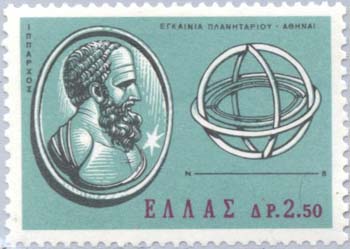|
|
Griechische Astronomie: Hipparchos Hipparchus before-mentioned, who can never be sufficiently praised, no one having done more to prove that man is related to the stars and that our souls are a part of heaven, detected a new star that came into existence during his lifetime; the movement of this star in its line of radiance led him to wonder whether this was a frequent occurrence, whether the stars that we think to be fixed are also in motion; and consequently he did a bold thing, that would be reprehensible even for God - he dared to schedule the stars for posterity, and tick off the heavenly bodies by name in a list, devising machinery by means of which to indicate their several positions and magnitudes, in order that from that time onward it might be possible easily to discern not only whether stars perish and are born, but whether some are in transit and in motion, and also whether they increase and decrease in magnitude - thus bequeathing the heavens as a legacy to all mankind, supposing anybody had been found to claim that inheritance! Pliny, Natural History, Book 2) 77 AD on Hipparchus
Hipparchus of ,
|
